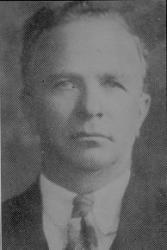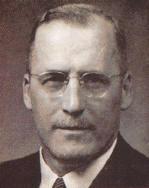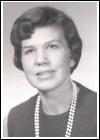Planning worship?
Check out our sister site, ZeteoSearch.org,
for 20+ additional resources related to your search.
- |
User Links
Person Results
John H. Sarchet
Composer of "[Go ye, go ye into all the world, and preach the gospel to ev'ry creature]" in Sunday School Anthem and Chorus Book
John H. Sarchet
Jessie Brown Pounds

1861 - 1921 Author of "Go Ye Into All the World" in Hymns for Today Jessie Brown Pounds was born in Hiram, Ohio, a suburb of Cleveland on 31 August 1861. She was not in good health when she was a child so she was taught at home. She began to write verses for the Cleveland newspapers and religious weeklies when she was fifteen. After an editor of a collection of her verses noted that some of them would be well suited for church or Sunday School hymns, J. H. Fillmore wrote to her asking her to write some hymns for a book he was publishing. She then regularly wrote hymns for Fillmore Brothers. She worked as an editor with Standard Publishing Company in Cincinnati from 1885 to 1896, when she married Rev. John E. Pounds, who at that time was a pastor of the Central Christian Church in Indianapolis.
A memorable phrase would come to her, she would write it down in her notebook. Maybe a couple months later she would write out the entire hymn. She is the author of nine books, about fifty librettos for cantatas and operettas and of nearly four hundred hymns. Her hymn "Beautiful Isle of Somewhere" was sung at President McKinley's funeral.
Dianne Shapiro, from "The Singers and Their Songs: sketches of living gospel hymn writers" by Charles Hutchinson Gabriel (Chicago: The Rodeheaver Company, 1916)
Jessie Brown Pounds
J. H. Fillmore

1849 - 1936 Composer of "["Go ye into all the world!"]" in Hymns for Today James Henry Fillmore USA 1849-1936. Born at Cincinnati, OH, he helped support his family by running his father's singing school. He married Annie Eliza McKrell in 1880, and they had five children. After his father's death he and his brothers, Charles and Frederick, founded the Fillmore Brothers Music House in Cincinnati, specializing in publishing religious music. He was also an author, composer, and editor of music, composing hymn tunes, anthems, and cantatas, as well as publishing 20+ Christian songbooks and hymnals. He issued a monthly periodical “The music messsenger”, typically putting in his own hymns before publishing them in hymnbooks. Jessie Brown Pounds, also a hymnist, contributed song lyrics to the Fillmore Music House for 30 years, and many tunes were composed for her lyrics. He was instrumental in the prohibition and temperance efforts of the day. His wife died in 1913, and he took a world tour trip with single daughter, Fred (a church singer), in the early 1920s. He died in Cincinnati. His son, Henry, became a bandmaster/composer.
John Perry
J. H. Fillmore
F. E. Belden

1858 - 1945 Person Name: F. E. B. Author of ""Even Unto the End"" in Christ in Song Belden was born in Battle Creek, Michigan in 1858. He began writing music in his late teenage years after moving to California with his family. For health reasons he later moved to Colorado. He returned to Battle Creek with his wife in the early 1880s, and there he became involved in Adventist Church publishing. F. E. Belden wrote many hymn tunes, gospel songs, and related texts in the early years of the Seventh-day Adventist Church. Belden was able to rapidly write both music and poetry together which enabled him to write a song to fit a sermon while it was still being delivered. He also wrote songs for evangelist Billy Sunday. Though Belden’s later years were marred by misunderstandings with the church leadership over his royalties, he did donate his papers and manuscripts to the church’s seminary at his death. He died on December 2, 1945 in Battle Creek, Michigan.
N.N., Hymnary. Source: http://www.hymntime.com/tch/bio/b/e/l/belden_fe.htm
F. E. Belden
Harry Dixon Loes

1895 - 1965 Author of "One by one" in Sing, Boys and Girls No.2 Pseudonyms:
Deal
Bartells
Born Harold Loes, the American gospel song writer took the middle name Dixon in honour of A. C. Dixon, the pastor of Moody Church at the time. Harry Dixon Loes studied at Moody Bible Institute, and after extensive training in music he served a number of churches with a ministry of music. From 1939 until his retirement he was a member of the music faculty of Moody Bible Institute. He wrote the lyrics for 1,500 gospel songs, and composed 3,000 tunes.
One day in 1915, Paul Rader preached a sermon in Moody Church, in Chicago. His theme was, “All that I want is in Jesus.” In the congregation was young Harry Dixon Loes, then a senior at Moody Bible Institute, where he would eventually teach. Inspired by Dr. Rader’s message, Harry Loes wrote the words and music for a song he called "All Things in Jesus." It was first sung by the church’s youth group.
Friends all around me are trying to find
What the heart yearns for, by sin undermined;
I have the secret, I know where ’tis found:
Only true pleasures in Jesus abound.
All that I want is in Jesus.
He satisfies, joy He supplies;
Life would be worthless without Him;
All things in Jesus I find.
Some carry burdens whose weight has for years
Crushed them with sorrow and blinded with tears.
Yet One stands ready to help them just now,
If they will humbly in penitence bow.
--http://wordwisehymns.com/2010/02/09/
==================
Harry Dixon Loes was born in Kalamazoo, Michigan, on October 20, 1892. After serving several churches as music director and later being active for more than twelve years in evangelist work, he joined the music faculty of Moody Bible Institute, in 1939, where he remained as a popular music teacher until his death in 1965. Mr. Loes was the writer of numerous gospel songs and choruses.
One day, while listening to a sermon on the subject of Christ's atonement entitled “Blessed Redeemer,” Mr. Loes was inspired to compose this tune. He then sent the melody with the suggested title to Mrs. Christiansen, a friend for many years, asking her to write the text. The hymn first appeared in Songs of Redemption, compiled by Marin and Jelks, in 1920, and published by the Baptist Home Mission Board, Atlanta, Georgia.
--http://www.gracecommunitycog.org/
Harry Dixon Loes
Adam Geibel

1855 - 1933 Composer of "["Go ye into all the world!"" in Junior Songs Born: September 15, 1855, Neuenheim, Germany.
Died: August 3, 1933, Philadelphia, Pennsylvania.
Though blinded by an eye infection at age eight, Geibel was a successful composer, conductor, and organist. Emigrating from Germany probably around 1864, he studied at the Philadelphia Institute for the Blind, and wrote a number of Gospel songs, anthems, cantatas, etc. He founded the Adam Geibel Music Company, later evolved into the Hall-Mack Company, and later merged to become the Rodeheaver Hall-Mack Company. He was well known for secular songs like "Kentucky Babe" and "Sleep, Sleep, Sleep." In 1885, Geibel organized the J. B. Stetson Mission. He conducted the Stetson Chorus of Philadelphia, and from 1884-1901, was a music instructor at the Pennsylvania Institution for the Instruction of the Blind. His works include:
Evening Bells, 1874
Saving Grace, with Alonzo Stone (Philadelphia, Pennsylvania: Stone & Bechter, Publishers, 1898)
Consecrated Hymns, (Philadelphia, Pennsylvania: Geibel & Lehman, 1902)
Uplifted Voices, co-editor with R. Frank Lehman (Philadelphia, Pennsylvania: Geibel & Lehman, 1901)
World-Wide Hosannas, with R. Frank Lehman (Philadelphia, Pennsylvania: Geibel & Lehman, 1904)
Hymns of the Kingdom, co-editor with R. Frank Lehman et al. (Philadelphia, Pennsylvania: Geibel & Lehman, 1905)
--www.hymntime.com/tch/
Adam Geibel
W. Oliver Cooper

1885 - 1963 Person Name: W. O. C. Author of "Go Ye Into All the World" in Victory Songs Use pseudonym Oscar J. Schwab
W. Oliver Cooper
Alfred P. Gibbs

1890 - 1967 Person Name: A. P. G. Author of "Preach the Gospel" in Choice Hymns of the Faith Alfred P. Gibbs was born in Birmingham, England in 1890 and was raised in Johannesburg, South Africa. He was led to a saving knowledge of Christ by his twin brother, Edwin. During World War I, Gibbs served as military chaplain, preaching to soldiers in training camps. In 1919 he set off for Moody Bible School in Chicago, Illinois. There he soon became involved in an assembly operated Rescue Mission. Gibbs worked alongside Harold Harper, T.B. Gilbert, James G. Humphrey, and other men destined to become well known in assembly circles of ministry. Gibbs became close friends with George Landis, who at that time pastored a small denominational church.
Alfred P. Gibbs never married. Like J. N. Darby, he lived out of a suit-case. Most of his writings were devoted to teaching young believers. He served part time for many years with, the then Emmaus Bible School. In1931 he published a songbook with music and words of his own composition. He also contributed several hymns to “Choice Hymns Of The Faith”, and “Hymns of Worship and Remembrance.” One of his most memorable hymns was “A Thousand Thousand Thanksgivings”, and also “Sweet Is The Story.”
Although an earnest preacher of the gospel, he was best known for his work with children. Gibbs was called home to glory through an automobile accident in 1967. Following the accident, an entire issue of Letters Of Interest was devoted to him. Reminiscences of him were written by several well known brethren including his brother Edwin, Bill McCartney, Elliot Van Ryn, T.B. Gilbert, Lester Wilson, William MacDonald, and Lloyd Walterick. A.P. Gibbs will be remembered as a great preacher of the gospel, and a loving friend to all children he met in his entire lifetime.
--www.plymouthbrethren.org/
Alfred P. Gibbs
Grace Weiser Davis

Person Name: G. W. D. Author of "Go Ye Into the World" in Favorite Gospel Songs Grace Weiser Davis USA 1860-1933? Born near York, PA, she married judge James Nixon Davis in 1889. They attended the Asbury United Methodist Church in York. She became a Methodist evangelist. In 1900 she moved to Jersey City, NJ. She compiled several works, including: “Gems of gospel songs” (1885), “Favorite gospel songs” (1894) with Elisha A. Hoffman, “Childhood conversions” (1897).
John Perry
Grace Weiser Davis


 My Starred Hymns
My Starred Hymns



